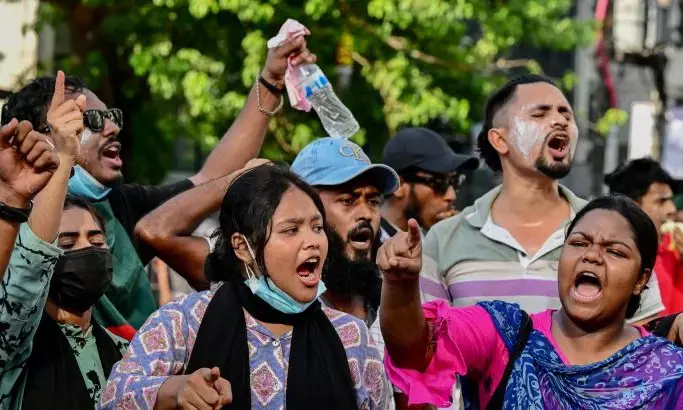Dhaka Violence Spreads Through Bangladesh
The BNP-led Opposition continues to protest

There is eerie peace in Bangladesh after the ‘Students Movement Against Discrimination’ called off the month-long agitation, saying they don’t want to protest at the cost of bloodshed. Some 200 persons were killed and over 300 injured in the violence.
Student protests began with the Dhaka High Court ruling of June 5, 2024 that reserved 56% of government jobs, including 30% for families of the freedom fighters, 10% for women and 10% for people from underdeveloped districts, 5% for indigenous communities and 1% for disabled persons.
The Sheikh Hasina government had already abolished the 30% quota in government jobs for families of freedom fighters way back in 2018, which the High Court revived. The protests and violence following the Dhaka High Court ruling were perhaps why Sheikh Hasina cut short her visit to China by a few hours and returned to Dhaka on July 14.
Subsequently, in a landmark decision by the Supreme Court of Bangladesh termed the High Court ruling illegal, and ruled that 93% jobs should be on merit, 5% percent reservation for relatives of freedom fighters and 2% for members of ethnic minorities, transgender and disabled persons; overall reducing reservations from 56% to 7%.
The alacrity with which the initial protests from Dhaka spread to rioting in other parts of Bangladesh was conspicuous. The opposition used the bloodshed to incite the masses.
China-Pakistan would have a hand in fuelling violence to depose the pro-India Sheikh Hasina Government and install an anti-India government like the erstwhile Bangladesh Nationalist Party (BNP). There is also the United States, leader of the so-called Rule-Based-Order, looking to destabilise South Asia.
The Bangladesh Police claim that the Islami Chhatra Shibir, the student wing of the Jamaat-e-Islami (JeI) has infiltrated the students’ movement and have resorted to subversive activities. Intelligence agencies of Bangladesh also report BNP and JEI, taking advantage of the students’ agitation, have seized the opportunity to try and topple the government using violent means. Significantly, gunpowder was used in setting fire to trains and river launches.
The BNP-led Opposition is continuing to protest in a bid to topple the Sheikh Hasina government while the student organisation is apprehensive of full implementation of the Supreme Court verdict.
There are concerns that Bangladesh-type of violent student protests could happen in India.
However, in the first place, a Supreme Court verdict in India giving 93% jobs on merit is impossible since all our political parties fall over each other to “increase” reservations – as a tool for electioneering.
Every political party lays claim to B. R. Ambedkar (who headed the Constitution drafting committee). They prostrate at his statue, and garland his bust on his birth anniversary or Constitution Day, but ignore that Ambedkar wanted reservations to end 10 years after the Constitution got promulgated.
The irony is that educational pass percentages are also lowered for the reserve category in India because all these decades, governments have not been able to provide requisite education to masses at the school level. It doesn’t matter to politicians if the overall standard of the country is lowered because it is all about votes. And, many lawmakers anyway are illiterate or have fake educational certificates.
That is why Prime Minister A. B. Vajpayee’s call for reservations to be linked with the financial standing was ignored. The result is a disjointed societal structure, with many millionaires in reserve category eating the cake and taking it home down the generations.
Unemployment figures remain ambiguous in India, as is the elusive census, last held in February 2011. Unemployed and educated unemployed, are going to every corner of the globe – be it Ukraine, Russia, Cambodia, Middle East, the West, you name it. Amid the increasing quota of reservations, the sucker is the “general category”. But can the general category protest by itself?
Politicians can engineer myriad distractions for the teeming number of unemployed, not just increasing reservation quotas; issues like mandir-masjid, caste, creed, Hindu-Muslim enmity, ethnic cleansing and the like.
New controversies can be sprung in a jiffy, like the recent one related to Kanwariyas, where the Supreme Court had to step in to say food sellers will “only” display the name of the food for sale.
The Rashtriya Swayamsevak Sangh (RSS) chief Mohan Bhagwat said no one should try to become Bhagwan. This raised eyebrows about a possible RSS-Bharatiya Janata Party (BJP) rift, but actually was a prelude to the government allowing government officials to join RSS. A social media query now is can military personnel sport RSS membership badges on the uniform?
Mamata Banerjee, Chief Minister of West Bengal, says refugees from Bangladesh must be entertained as per the United Nations mandate. But no one asks how they crossed the border manned by Border Security Force (BSF) which is directly under the Ministry of Home Affairs. Is the money being charged shared?
Himanta Biswa Sarma, CM of Assam, says it is a matter of life and death for him that the Muslim population of Assam has jumped to 40%. Did he discover this last night and why has his political party in power for more than 10 years not enacted a Population Control Bill – when so many bills have been passed without any discussions?
Finally, whether Bangladesh-type of violence against reservations can occur in India – your guess is as good as mine given the special variety of political class we have.
Lt General Prakash Katoch is an Indian Army veteran. Views expressed here are the writer’s own.



